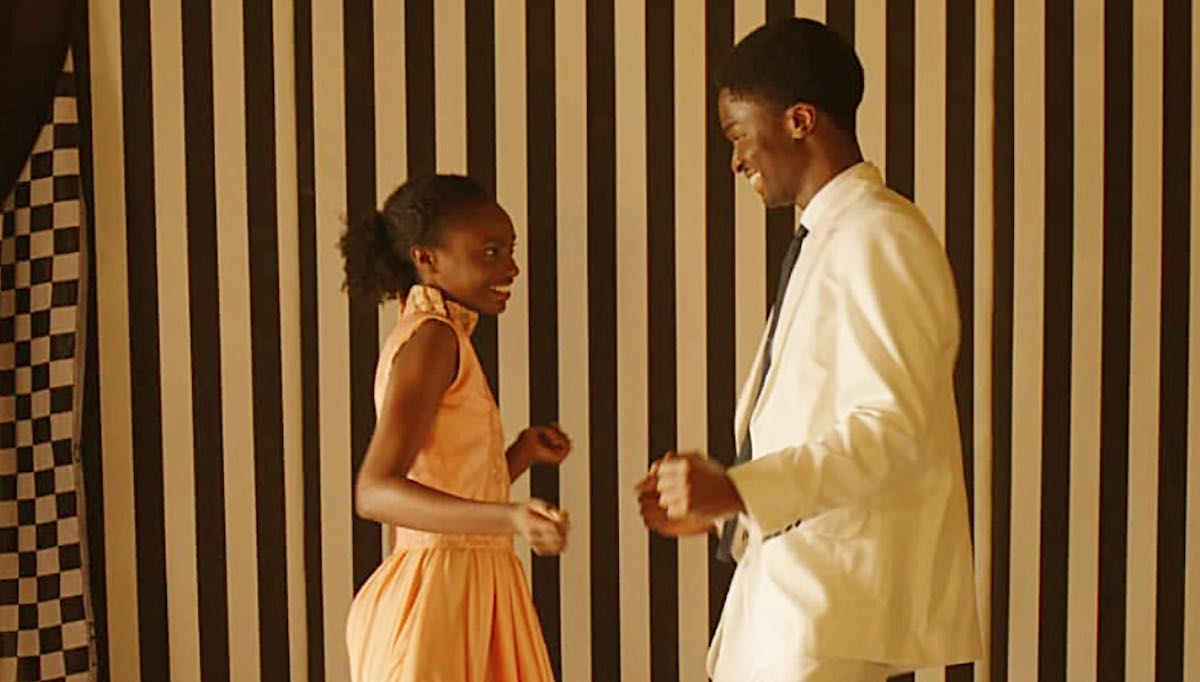
The new film Dancing the Twist in Bamako has a lot on its mind. It's an historical depiction of the political activism that shaped Mali, the eighth largest country in Africa, while also an appealing love story and family drama.
The year is 1962. French colonialists have departed from Mali, abandoning it to local tribes to sort out trade. We meet young Samba Touré as he is spreading the word of socialism and meeting with stiff opposition from village patriarchs and his father, whose livelihood is challenged by the shifting politics. Enter Lara, whom we first see dancing at a popular joint, the Happy Boys Club. The Twist is dance taking the youth of Mali by storm, but Lara is out of sync. Wild-haired and waifish, she flails away in an older style until she is literally pulled off the dancefloor by her husband, and summarily raped. Lara has no defense against the assault: she is the wife in an arranged (read "forced") marriage, and by law a wife must submit. She flees their marital bed, stows away in a pickup that turns out to be Samba's. When Samba discovers this stranger, he wants to take her back. But Lara's defiant, and eventually Samba and his crew take her to their village, arrange lodgings, and she hides out.
Samba and Lara hit it off over the Twist. Western pop culture is analogous to revolution in Dancing, and there's much joie d’vivre in this accomplished film. American rock 'n' roll peppers the soundtrack (some of it out a bit out of time: both the Beach Boys' "I Get Around" and the Supremes' "Where Did Our Love Go" were released later, in 1964) but the point is made. Given its subject matter -- love amongst "economic decolonization" -- Dancing the Twist in Bamako is always involving, due in large part to its attractive young cast.
Stephane Bak as Samba brings strident commitment to the cause yet melts at the very sight of Lara, portrayed by Alice Da Luz. Scenes with the two of them together are charming. Mr. Bak has previously appeared in Wes Anderson's The French Dispatch and Paul Verhoeven's Elle. Ms. Da Luz is a Gucci model born and raised outside Paris; this is her first film.
Lara is skeptical of Samba's fervor. "You think we'll be free one day? Seriously?" she says, when he gets on his soapbox. She reminds Samba that "being equal doesn't make us the same," and when he preaches solidarity to farmers, it's Lara who tells him, "Stop talking. They understand." Samba and Lara's romance will benefit from a socialist government’s adopting of a "family code," which will do away with the sort of arranged marriage under which Lara is oppressed. She's still married, after all; no matter how close she and Samba get, that's always hanging over them, and it gears up the suspense of the film.
Other members of the cast add spice to the proceedings: Bakary Doimbera as Badian, Samba's frivolous younger brother, is comic relief, and Saabo Balde and Ahmed Dramé as Samba’s cohorts make effective foils. Dioc Koma as Namori, Lara's jilted husband, has subtle moments of sympathy for his fugitive wife. He tells Lara’s headstrong brother, with whom he's tasked to retrieve Lara, "Look at her. Her eyes are shining. She's happy," even as they connive to bring her home. Family pride is much venerated in the social order, and Lara's escape and affair casts shade on her family's legacy.
French director Robert Guédiguian (Gloria Mundi, The Snows of Kilimanjaro) has 21 features and many awards to his credit. He co-wrote the script with Gilles Taurand and they pull together the various threads of the narrative with panache: "We wanted to tell a beautiful and tragic love story to embody what I call this 'communist moment', of construction, of revolutionary celebration where possibilities clash with counter-revolution but also with tradition and ancestral customs," says Guédiguian.
His film captures that moment and is a refreshing reminder of the idealism and innocence of the 1960s, which extended as far as Mali. Young people cruise in jalopies and pickups to the strains of "Be My Baby" and "Da Do Run Run." Bedroom walls are adorned with Gene Vincent posters. We see the African countryside in its variety, its dusty roads and dry earth the setting for Samba and Lara's uneasy courtship. (Filming in Mali was impossible due to the political climate, so it was shot in Senegal. "As a result," says Guédiguian, "it is not Bamako that we see on the screen but Thiès, next to Dakar airport, which is Senegal's second largest city.")
Standout moments in Dancing include Samba's father’s charge in a march on the government (foreshadowing the Jan. 6 storming of the U.S. Capitol), and a wonderful sequence in which Samba's crew visits a small farming village to proselytize, and ends up tilling a neglected garden, bringing it back to life as an illustration of socialism's virtues. Lara is the first to grab a hoe and pitch in, digging while she leads the others, then the entire village, in jubilant song.
Guédiguian was inspired to make the film when viewing an exhibit by photographer Malick Sidibe, and in particular an image of a young couple dancing, he in a white suit, and she barefoot in a dress. In real life, the couple in the photo are brother and sister, but Guédiguian changed them to lovers in the film.
Dancing the Twist in Bamako's distributor, ArtMattan Films, specializes in movies that focus on the human experience of people of color all over the world with a special focus on Africa, the Caribbean, North and South America, and Europe. Their impressive catalog can be accessed at their website, artmattanfilms.com, which also links you to affordable rentals.
_____________________________________________________________
Dancing the Twist in Bamako, directed by Robert Guédiguian. 129 Minutes. France. 2021.
